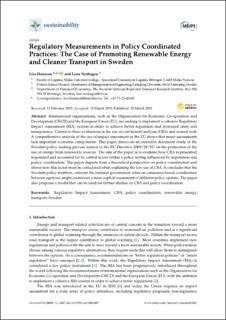Regulatory measurements in policy coordinated practices : the case of promoting renewable energy and cleaner transport in Sweden
Peer reviewed, Journal article
Published version

Åpne
Permanent lenke
https://hdl.handle.net/11250/3094418Utgivelsesdato
2019Metadata
Vis full innførselSamlinger
- Artikler [388]
- Publikasjoner fra Cristin [404]
Sammendrag
International organisations, such as the Organization for Economic Co-operation and Development (OECD) and the European Union (EU), are seeking to implement a cohesive Regulatory Impact Assessment (RIA) system in order to achieve better regulation and increased unity and transparency. Central to these evaluations is the use of cost-benefit analysis (CBA) and related tools. A comprehensive analysis of the use of impact assessment in the EU shows that many assessments lack important economic components. This paper draws on an extensive document study of the Swedish policy making process related to the EU Directive 2009/28/EC on the promotion of the use of energy from renewable sources. The aim of the paper is to examine how CBA is presented, negotiated and accounted for by central actors within a policy setting influenced by negotiation and policy coordination. The paper departs from a theoretical perspective on policy coordination and shows how this factor must be considered when explaining the low use of CBA. It concludes that the Swedish policy tradition, wherein the national government relies on consensus-based coordination between agencies, might counteract a more explicit assessment of different policy options. The paper also proposes a model that can be used for further studies on CBA and policy coordination. View Full-Text Keywords: Regulatory Impact Assessment; CBA; policy coordination; renewable energy; transport; Sweden
